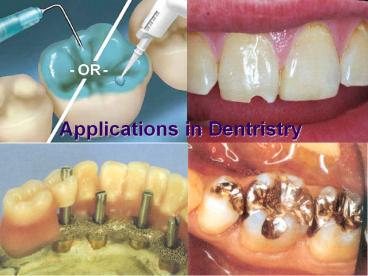Applications in Dentristry - PowerPoint PPT Presentation
Title:
Applications in Dentristry
Description:
Applications in Dentristry ADHESIVE DENTISTRY Indications Replace carious and fractured tooth structure. Fill erosion or abrasion defects in cervical areas. – PowerPoint PPT presentation
Number of Views:168
Avg rating:3.0/5.0
Title: Applications in Dentristry
1
Applications in Dentristry
2
ADHESIVE DENTISTRY
- Indications
- Replace carious and fractured tooth structure.
- Fill erosion or abrasion defects in cervical
areas. - Correct unaesthetic shapes, positions,
dimensions, or shades. - Bond silver amalgam restorations.
- Cement crowns.
3
Indications-continued
- Bond orthodontic brackets.
- Treat dentinal hypersensitivity.
- Repair fractured porcelain, amalgam, and resin
restorations. - Pit and fissure sealants.
- Core build up foundations.
4
Sealants
1. Etch enamel
3. Light cure
Courtesy of 3M Dental Products
5
Glass-ionomers
- Most commonly referred to as glass ionomer
cements (GIC's). - These are materials which consist of an aqueous
polyacrylate and a fluoroaluminosilicate glass. - These set by an acid-base reaction in the
presence of water. - These cements appear to adhere to tooth
structure by formation of ionic bonds as a result
of chelation of the carboxyl groups in the acid
with the calcium and/or phosphate ions in the
apatite of enamel and dentin.
6
COMPOSITION
- POWDER CALCIUM FLUOROALUMINOSILICATE GLASS
- Silicon 13.3 Phosphorus 2.5
- Aluminum 13.3 Fluoride 22.7
- Calcium 17.3 Oxygen 28.0
- Sodium 1.6
- LIQUID POLYACRYLIC ACID OR
- COPOLYMER OF ACRYLIC ACID
- WATER
7
(No Transcript)
8
Composites
9
Most Common Dental Resin
bisphenol A glycol dimethacrylate
triethylene glycol dimethacrylate
10
(No Transcript)
11
(No Transcript)
12
(No Transcript)
13
Fractured incisors
http//www.seattle-dentist.com/chipped-teeth.htm
14
LINKMAX
50 Yellow 50 Pink Micro-Tips
Self-Etching Primer EP-B
Packaging
Self-Etching Primer EP-A
Mixing Pad
LINKMAX A3 Cartridge
LINKMAX Clear Cartridge
Ceramic Primer
Dispensing Dish
Metal Primer II Package
Micro-Tip Handle
Mixing Spatula
15
Paste Pak Dispenser
Produces Ideal Consistency Every Time.
Dispenses The Exact Mixing Ratio No Matter How
Little Or How Much Material Dispensed. Metering
Slide Enables The User To Control The Volume Of
Material Dispensed To Reduce Waste.
More
Less
16
Dual Cure Light Cure Self Cure
Temporary Light-Cured Linkmax Removes Easily
With Hand Instrument One Minute After Seating.
No Radical Clean-Up Procedure Should Be
Required. Light-Cure Each Surface Of
Restoration 20 Seconds. When Used Under Metal
Or When Cement is Difficult To Expose To Light,
Linkmax Self-Cures In 6 Minutes From Placement Of
Prosthesis.
17
BONDING MICRO-FILLED HYBRID RESIN
Apply thin layer to prosthesis with micro-tip.
Light-cure for 20 seconds Using a VLC Curing
Light.
Shake the Self-Etching Primer bottles, then
dispense one drop each into dispensing dish and
mix for 5 seconds. Apply to tooth surface.
Hold for 1 minute. Light-cure for 1-2 seconds
then remove excess.
Light-cure each surface for 20 seconds.
Apply LINKMAX to primed porcelain surface.
Dispense LINKMAX and mix for 10 seconds.
18
BONDING MICRO-FILLED HYBRID RESIN
Composite Primer
LINKMAX
Self-Etching Primer
MFR Hybrid Resin Inlay
Composite Primer
LINKMAX
Self-Etching Primer
NOTEWhen bonding MFR hybrid resin (with main
ingredients of organic fillers) from another
manufacturer, apply CERAMIC PRIMER to the
prosthesis instead of COMPOSITE PRIMER.
19
BONDING PORCELAIN
Dispense one drop each Ceramic Primer into
dispensing dish and mix for 5 seconds. Apply to
bonding surface and dry.
Shake the Self-Etching Primer bottles, then
dispense one drop each into dispensing dish and
mix for 5 seconds. Apply to tooth surface.
Apply etchant, after 30 seconds, rinse with water
and dry.
Hold for 1 minute. Light-cure for 1-2 seconds
then remove excess.
Light-cure each surface for 20 seconds.
Apply LINKMAX to primed porcelain surface.
Dispense LINKMAX and mix for 10 seconds.
20
BONDING PORCELAIN
Etchant
Etchant
Ceramic Primer
Ceramic Primer
LINKMAX
LINKMAX
Self-Etching Primer
Self-Etching Primer
Porcelain Inlay
Ceramic Primer
Etchant
LINKMAX
Ceramic Primer
LINKMAX
Self-Etching Primer
Self-Etching Primer
Porcelain Veneer
Etchant
21
BONDING METAL PROSTHESIS TO TOOTH STRUCTURE
Metal Primer II
Metal Crown
LINKMAX
Self-Etching Primer
22
(No Transcript)
23
The future
- Adhesive dentistry
- Improving the properties of adhesive materials.
e.g. wear resistance, strength - Biocompatible materials
- Antibacterial, bioactive, drug delivery
- Increasing use of implants
- Shorter healing periods
- Poorer quality bone
- Less bone
- Growing natural teeth































